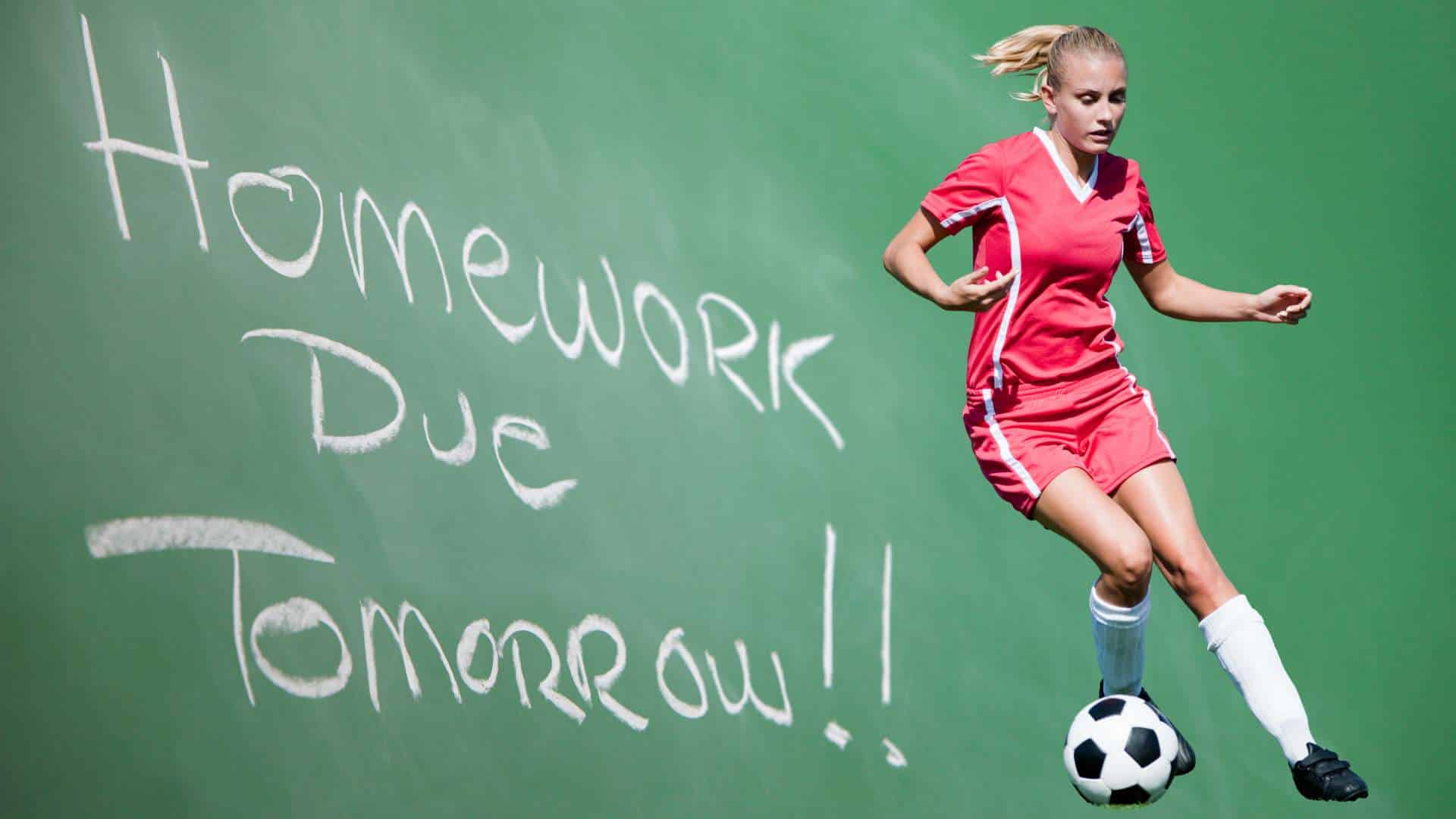Your coach and team count on you to play your best. You’ve got class assignments due and tests to study for. Your friends want you to go out. Where’s the time?

A soccer player is juxtaposed against a warning on a blackboard that homework is due. (Illustration by News Decoder)
This article, by high school student Mila Heron, was produced out of News Decoder’s school partnership program. Mila is a student at The Hewitt School in the United States, a News Decoder partner institution. Learn more about how News Decoder can work with your school.
It was back in fourth grade that I began playing competitive soccer. I had been in gymnastics when I broke my arm and I couldn’t compete again for months. My arm healed and physically I was able to do the skills necessary. But mentally? Well, I had developed anxiety and post traumatic stress and I had a mental block when it came to competing again. Ultimately I quit gymnastics, the sport I loved.
Now that I’m in high school I’m playing soccer at a high level. But I’m experiencing anxiety in a different way. It comes from the difficulty of balancing the competing pressures of my sport and academics. This is a challenge every student athlete I know goes through.
As a student athlete you have constant training and classes. That leaves little to no free time.
Although every athlete is different, almost all athletes have experienced stress and anxiety towards both of these activities. Whether it’s having to study late at night to rush through school work or skipping practice to finish assignments, it’s a difficult balance for a teenager.
Take Abigail Potenza, a student athlete who attends my school in New York City. She said that to balance school and sports she has developed a “routine”; she completes her work at night or in the car on the way to and from practice.
Pressure from within
Student athletes often push themselves to their limit. They have a mindset of more pain more gain. Even at a young age, there is so much pressure on them to perform so they feel like they have to keep pushing themselves. This constant pressure causes increased stress and anxiety levels.
A study by researchers in the United States in 2023, published in Health Psychology Research, found that rates of anxiety and depression have been steadily increasing among high school athletes for more than a decade.
The study found that when student athletes struggle with their workload, they often suppress their anxieties, which makes things worse.
St. Agnes Academy, an all-girls preparatory school in the U.S. state of Texas, recognized in an 2023 article that the “pressure to excel both in the classroom and on the field can be overwhelming, placing a heavy burden on the mental health of student-athletes.”
But perhaps the biggest reason that there is a spike in stress and anxiety among student athletes is due to the pressure they put on themselves. Two decades ago the world seemed very different. So did the economy.
Pressure to succeed
Many students, for many years, have seen athletics to be a path to financial freedom in either college prices (through scholarships) or as a career (professional athletes). College athletics has become increasingly more competitive, so has academics. Many high school athletes pile more up onto their plate when they physically don’t have the ability to keep up with their busy schedule.
When you have to balance school and sports there’s little time to actually be yourself beyond your sport and academics. Student athletes find that all of their friends are divided between those two activities in their lives, but they rarely see them outside the sport or class.
With little free time during the season these student athletes tend to get wrapped up in just getting by in school, and just being relieved their work gets turned in on time.
The Holston Academy, an online private K-12 school headquartered in California, argues that the level of stress and pressure student athletes are under makes a case for non-traditional education models that provide more flexible scheduling.
Student athletes typically need a different type of structure to allow them to still be kids while enjoying their sports and having a successful academic life. Many student athletes who are committed to their sports prioritize those sports over academics.
Finding free time for friends
Some students who don’t want to give up the normalcy of attending a regular school instead attend boarding school. That’s what my brother Ayden does.
At boarding school you can dive into your sports and play at a high level. But since you live at school, you are surrounded by your friends in your dorms. Going to boarding school gives you a high-intensity learning environment, as well as a high level of athletics. However, it also gives you more time for social interactions.
Ayden was able to repeat his junior year to give himself an extra year to develop. This is a common step for student athletes. It helps them be a better prospect in the college recruitment process.
When it comes down to sports or academics a lot of students choose to focus on their athletic performance not only in response to the pressure they put on themselves but also from the pressure that others put on them. However, it depends on the student when it comes to which one they prioritize. Some feel equal pressures through academia and athletics, others more from school, and others more from their sport.
Schoolwork is a key factor for a student athlete’s anxiety and stress. They often have less time to complete their work than someone not involved in sports. Sometimes, they must miss classes for games. On road trips for their sport they are forced to teach themselves material they would otherwise learn in class and study until ridiculous times of the night.
Finding time for schoolwork
Time management becomes a challenge. Everybody, no matter their interest, needs free time to relax. Athletes rest when they can even when they should be prioritizing school work. This leads to procrastination and makes it hard for these students to complete their work. That’s a problem my brother faces.
“Every day is different,” he said. “Sometimes my workload is heavier based on that day’s scheduling but some days it’s more about getting myself to do the work than the actual time allotted to do it.”
With the small amount of time student athletes have to complete their work they often feel rushed. They have little time to think about their work before it is due or and no time to revise it.
“During the winter term with practice everyday and games one to three times a week, it became very hard to keep up with work,” Ayden said. “Sometimes it wasn’t even the timing of it but how exhausting days were, so by the time you did your work, your mind wasn’t fully there.”
It’s understandable that these athletes would struggle to focus. At the end of the day they are physically and mentally exhausted. In the off season athletes have more time but because they need to stay in shape, they still have to workout.
Accommodating student athletes
Still, sports remains a passion. It is an escape from school and a way for students to express themselves. Not all students are gifted academically but they can excel in sports. And many schools provide strong support systems.
While I can’t speak about all schools, I know schools in New York City that provide opportunities for athletes to make up their work, speak to the school counselor or seek extra help from teachers.
One sophomore from the school I attend said that her teachers were understanding and willing to give a small extension or set up a meeting or provide help outside of class when needed.
Another student who I spoke to said it helps to build good relationships with teachers. When he has had to miss tests for road trips, for example, his teachers accommodated that by letting him take the test whenever he could.
With good support systems in these schools, these teenagers are able to succeed in their academics and excel in their sports even as they feel the stress of preparing for their futures in college and adulthood.
Balancing sport and school
Throughout my whole life I’ve been in and out of sports whether it was gymnastics, tennis or soccer. I’m currently a high school junior and I play competitive soccer. For 10 years I’ve managed my workload and schedule while traveling.
Adapting to high school was hard. I put a lot of pressure on myself to succeed in both my academics and athletics.
That’s why I wanted to write this article about how the mental health of student athletes is often hidden. There is a lack of attention on their needs outside of their sport and schoolwork.
Based on my own experience, stress can lead you to lose your love of sport. When that happens you have to work towards loving it again. You have to enjoy playing and not put a huge amount of expectations on yourself. It’s those high expectations that can bring you down.
Once I understood the balance between the pressure and enjoyment of the sport, I became a better soccer player and teammate.
I was happy to attend practice even though I had a pile of homework waiting for me. The sport is worth it once you know how to manage it. To be an athlete who also wants to excel at school you must accept the schedule and routines that you have built.
Sometimes that means having to miss a social event because you have an early morning practice or game or you can’t hang out with your friends because you’re away.
But it’s all about balance. Maybe you can’t go to a birthday party or you have to make up homework you missed. But that doesn’t mean your social life ends. Maybe next weekend will be different. Maybe you’ll find a time during the off season to see all your friends.
The important thing is to make your time worth it.
The views and citations expressed by this student journalist are their own and not those of their school or any person or organization affiliated or doing business with their school.
Questions to consider:
1. What are some of the pressures on high school athletes?
2. How can friendship be a pressure?
3. How do you try to balance the different responsibilities you have?

Mila Heron is in the third year at the Hewitt School in New York City. Mila is a competitive soccer player who wants to bring awareness to mental health issues in sports and how important it is that people educate themselves on this topic.
